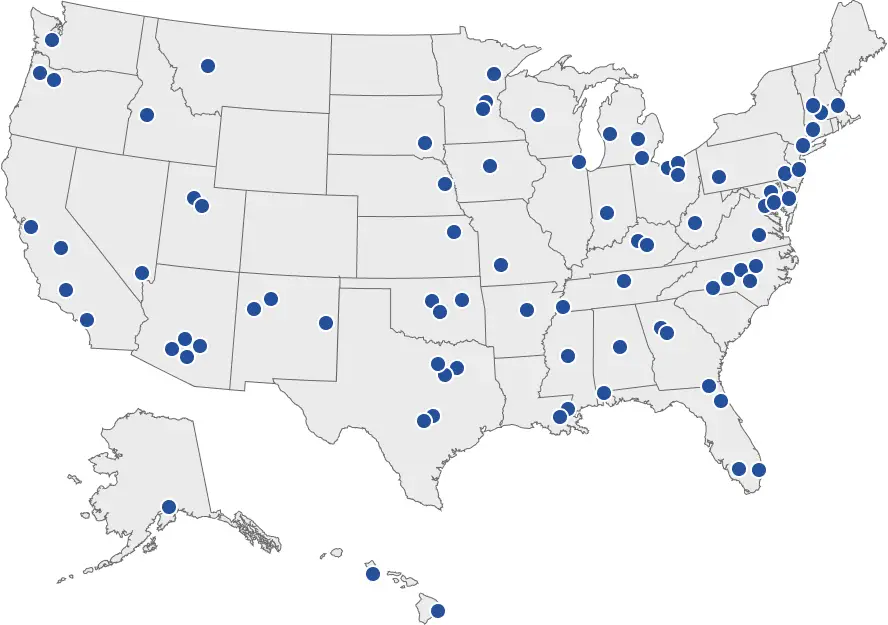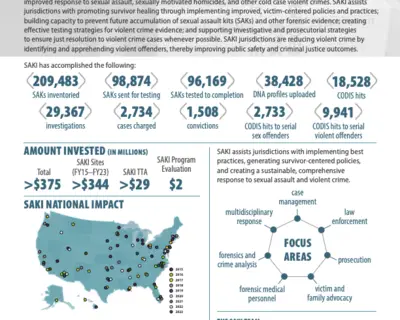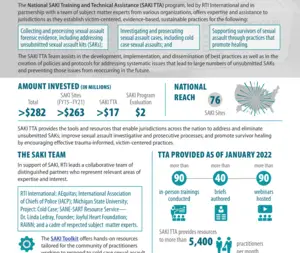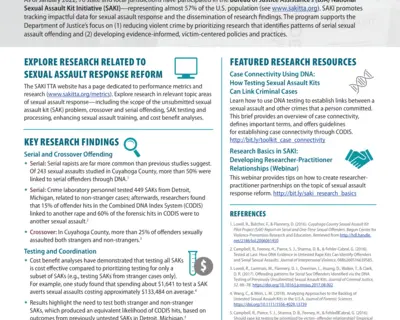A national program assisting the implementation and enhancement of effective and sustainable practices while supporting survivors of sexual assault
Objective:
To enhance the national response to sexual assault through the development and delivery of training and technical assistance to practitioners implementing a comprehensive and victim-centered approach.
Approach:
Provide training and technical assistance on addressing unsubmitted sexual assault kits, forensic testing strategies for sexual assault evidence and victim-centered investigations and prosecutions for sexual assault cases.
Impact:
Making communities safer and improving the nation’s response to sexual assault and violent crime by delivering evidence-based practices and knowledge to those who work to support victims of sexual assault and other violent crimes.
For the most up-to-date information regarding the National Sexual Assault Kit Initiative program, please visit the SAKI website.
Unsubmitted sexual assault kits (SAKs) create delays in the justice system and, in some instances, deny justice to sexual assault survivors. SAKI is a national program dedicated to creating a coordinated community response to sexual assault and violent crime through a comprehensive and victim-centered approach that builds jurisdictional capacity to support the effective submission and testing of sexual assault kits while implementing sustainable strategies for the effective investigation and prosecution of sexual assault cases and violent crime. Through the SAKI project, victims are supported through the healing process with advocacy services while jurisdictions implement best practices for violent crimes response reform improving public safety by bringing just resolution to these cases whenever possible.
Implementing Training on Collection and Processing of Forensic Evidence for Sexual Assault Cases
In 2015, the Bureau of Justice Assistance selected RTI to provide training and technical assistance for its SAKI program.
The SAKI Training and Technical Assistance (TTA) program supports coordinated teams of law enforcement, prosecutors, crime laboratory professionals, sexual assault nurse examiners (SANEs), forensic medical personnel, and victim and family advocates. SAKI TTA provides evidence-based, victim-centered, and sustainable practices; these practices help with collecting and processing forensic evidence, investigating and prosecuting sexual assault cases, and supporting sexual assault survivors. SAKI TTA offers the support that jurisdictions need to navigate the unique challenges associated with an improved response to sexual assault and violent crime.


As of 2024, 90 jurisdictions have been funded through SAKI—including 31 statewide sites. Collectively, SAKI sites, both previously and currently funded, represent 43 states and the District of Columbia. These jurisdictions receive customized TTA from our experts to effectively execute their SAKI goals and create a holistic community response to sexual assault that supports victim healing, holds offenders accountable, and improves public safety. This program provides the support and resources needed to address unsubmitted SAKs—including support to inventory, test, and track SAKs; improve practices related to investigation, prosecution, and victim engagement; access necessary training to increase effectiveness in addressing the complex issues associated with these cold cases; and implement multidisciplinary policy development and coordination.
SAKI TTA provides the tools and resources that enable jurisdictions to address and reduce the number of unsubmitted SAKs; improve sexual assault investigative and prosecutive processes; and promote survivor healing by encouraging effective trauma-informed, victim-centered practices—including the following:
- Creating and maintaining a sexual assault response team (SART) and multidisciplinary team
- Identifying and implementing impactful investigative steps
- Overcoming challenges related to cold case sexual assault prosecutions
- Encouraging establishment of local SANE programs
- Linking crime laboratory information systems with investigations and prosecutions
- Developing strategies for victim notification, engagement, and support throughout the entire criminal justice process
- Designing multidisciplinary, trauma-informed, and victim-centered training
By encouraging the adoption of data-driven and effective practices, we aim to facilitate the multidisciplinary SART concept—particularly in jurisdictions with a significant number of unsubmitted SAKs.
In support of SAKI, RTI leads a collaborative team of distinguished partners who represent relevant areas of expertise and interest; these partners include law enforcement officials, forensic medical personnel and SANEs, prosecutors, sexual assault response researchers, victim advocacy professionals, crime laboratory analysts, and curriculum development personnel.
Improving Sexual Assault Investigation and Response for Sexual Assault Victims
Our project activities enhance the understanding of sexual violence and trauma for law enforcement officials, forensic medical professionals, and prosecutors; additionally, such activities bolster the capacity of these groups to address sexual assault and respond in meaningful ways to sexual assault victims. Since the SAKI program began, grantees inventoried 203,552 sexual assault kits (SAKs) and sent 95,140 SAKs for testing.
| SAKs Inventoried | 203,552 |
|---|---|
| SAKs Sent for Testing | 95,140 |
| SAKs Tested to Completion | 90,851 |
| DNA Profiles Uploaded | 36,323 |
| CODIS Hits | 17,670 |
| Investigations | 26,938 |
| Cases Charged | 2,520 |
| Convictions | 1,428 |
| CODIS Hits to Serial Sex Offenders | 2,553 |
| CODIS Hits to Serial Violent Offenders | 9,519 |
As the metrics in Table 1 show, agencies with SAKI funding are seeing great results from testing their previously unsubmitted SAKs. From the 95,140 SAKs sent for testing, 90,851 have been fully processed—with 36,323 returning DNA profiles. When uploading the DNA profiles to the Combined DNA Index System (CODIS), those profiles have returned 17,670 hits supporting 26,938 case investigations—with 2,520 of those being charged. Processing these SAKs has also led to 1,428 convictions.
Our team also partners with law enforcement officials, forensic scientists, and legal stakeholders to collaborate and provide the necessary skills, tools, and knowledge to effectively investigate and prosecute sexual assault crimes. As of 2024, we have conducted more than 100 webinars, produced more than 45 written briefs, and provided over 100 TTA events (on-site and virtually), reaching over 3,000 attendees. Additionally, we created the SAKI Toolkit and SAKI Virtual Academy, which are web-based resources designed to create customized curriculum supporting the SAKI holistic approach to sexual assault response reform.
The SAKI Toolkit (opens in new window) offers hands-on resources tailored for the community of practitioners working to respond to cold case sexual assault. Toolkit users can explore key categories of sexual assault response reform, browse topics centered around skill development, and save tools to a customizable dashboard known as the briefcase.
The SAKI Virtual Academy (opens in new window), an online learning platform, offers five e-learning curricula covering the key steps to sexual assault response reform. The curricula are broken out into a total of 24 separate e-learning modules to allow learners to complete courses at their own pace. Throughout each course, learners complete knowledge checks and case study challenges to assess their comprehension of the course content.
SAKI TTA routinely educates more than 6,900 national sexual assault response professionals through briefs, SAKI Toolkit, Virtual Academy, and webinars. All SAKI TTA materials are housed on the SAKI TTA website (www.sakitta.org) and are available to all agencies for free.
Ultimately, the SAKI program will continue to make communities safer and improve the nation’s criminal justice system by delivering evidence-based practices and knowledge to those who work to support victims of sexual assault and other violent crimes.
- Bureau of Justice Assistance
- USDOJ
- IACP
- Aequitas
- Michigan State University
- Joyful Heart Foundation
- RAINN
- Project: Cold Case
- Wichita State University











